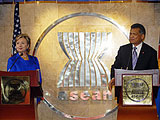SE Asia: B-words, P-words, C-words
By Simon Roughneen for ISN
Long-slated as a flaccid talking shop, ASEAN began to muster up some multilateral mojo during 2008, when it played a key role in persuading the Burma dictatorship to let international aid agencies into the Irrawaddy delta region, destroyed by Cyclone Nargis.
That belated beseeching of the jungle junta has been spun - incongruously - as proof the hitherto gummy bear bloc has teeth. ASEAN member-states have previously shied from confrontation, with state sovereignty and face-saving prioritized over alleviating human suffering and tough talk over disagreements and challenges.
This is does no harm, sometimes, given the need for judicious use of the c-word in inter-state relations: "Compromise" is perhaps the one essential trait that separates politics from other activities. However, as the world's economic powers flail amid the downturn - like blindfolded hostages sensing their torturers closing in - the export-oriented ASEAN nations have good reason to talk and act with unusual urgency.
With most of the region dependent on US and European consumers buying the eventual finished product, ASEAN member-states are part of a global supply chain that sees them send parts and part-finished goods, often to China, for cobbling together into the final boxed-for-shelf version.
With that in mind, the p-word cropped up quite a bit in the Thai resort: Leaders proclaimed sotto voce against "protectionism," both within the bloc and elsewhere - the latter perhaps an implicit rebuke to the US and European countries mulling nativist economics. Not shy of self-contradiction, some member-states simultaneously talked up their own "buy local" gambits, undermining the rhetorical commitment to open trade. But for once, using more walk than talk, ASEAN inked free trade agreements with Australia and New Zealand, though the impact of this on economic recovery will be limited for now.
Just weeks after new US Secretary of State Hillary Clinton made Indonesia part of her first overseas visit, the region looks set to acquire new-found geopolitical importance. Stretched over a distance equivalent to that from Ireland to Iraq, the Indonesian archipelago has the largest Muslim population of any country. Bolstered by US, Australian and Singaporean support, it has chalked up some big anti-terror wins in recent years, undermining the Jemaah Islamiyah network on its islands.
With Indonesia about to hold another set of elections, the next in a presumably smooth ongoing transition from autocracy and the 1998 financial crisis chaos, Jakarta looks set to become a poster child for Muslim democracy - perhaps an unwitting nod by US President Barack Obama to his predecessor's conviction that Islam and democracy can co-exist.
This, and the US$170billion in trade between the US and ASEAN members, perhaps prompted the recent appointment of a US ambassador to the bloc. And given that 40 percent of world trade passes through the pivotal Strait of Malacca, including much of China's oil imports, the region will surely be a hotbed for Sino-US rivalry in the coming years.
This c-word, "China," offers both challenge and opportunity for ASEAN members. Even traditional US allies such as the Philippines, which has ongoing territorial disputes with Beijing, have played both sides off each other. However, the recent downturn has highlighted some of the limits to China's rise. As western consumers take scissors to credit cards, ASEANs finished goods have nowhere to go, as Chinese consumers save rather than spend.
Another c-word is "charter": The ASEAN Charter, signed off in December 2008, aims to lay the bedrock for a more integrated bloc later on. However, one aspect - the commitment to uphold regional human rights - is undermined by the omission of any enforcement mechanism to be deployed against recidivists.
And that takes us right back to the b-word: Burma. Despite the much-trumpeted success in getting General Than Shwe and his cronies allow international help into the cyclone-afflicted region, ASEAN remains almost as ineffective as the UN in bringing about substantive change in one of the world's old school tyrannies. Some might ask, with substantial business links between Thailand, Singapore and the junta, and China and India jostling for oil and gas concessions either side, why would it?
But any pretence that ASEAN is pushing human rights, democracy and basic freedoms for Burma's people, is merely evocative of another b-word.

